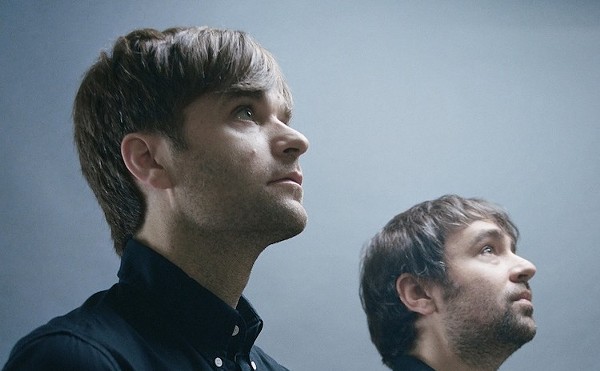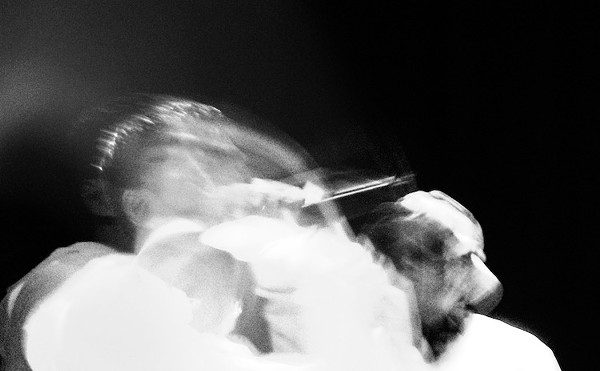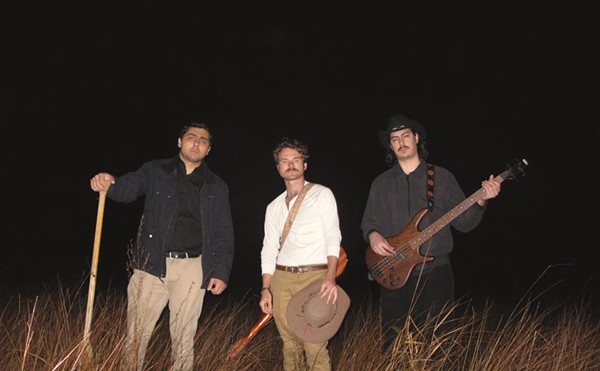I am a golden god!" howls a '70s-tressed Billy Crudup in this year's rock-journalist biopic Almost Famous, signaling a fall -- as much from an LSD overload appropriate to that period's gypsy-like rock-star posturing as from the rooftop on which he is standing. It's the sort of fantasy that used to fuel an industry built upon drilling holes in nasal passages while being holed up in European castles for months on end recording the soundtracks of entire generations. Rock stars used to be something -- and then, with a flair for romanticism or acrimony, be dead.
Today, just as the iMac exposes its memory board, the music industry likewise finds itself comfortably revealing the engines that power its eternally replicating heroes and their platitudinous rhyme schemes. Mystery and metaphor be damned; we really need to know.
So why is it that Creed, the latest embodiment of the tried-and-tested road heroes who characterized screenwriter and director Cameron Crowe's almost-gritty rock revisitation, aren't that interesting? Sure, to us they are, a bit. After all, the band hails from Orlando, where two of its current three members graduated from high school and to which they relocated their base from Tallahassee a couple of years ago. (Read Orlando Weekly's review of Creed's latest Orlando performance.)
But despite their popular victory at last week's My VH-1 Music Awards, where an almost humble Scott Stapp not only professed gratitude for the fans, but added, "We'd like to thank the critics for helping keep us motivated and keep the fire burning, because without your `harsh and disapproving` words, we might have gotten complacent," Creed continue to avoid the general public's curiosity about their personal lives, all the while maintaining a firm grip on the common man's (and the teen-age girls' -- everybody, really) subconscious pop submission.
Short of the carefully coifed chest hairs on Stapp's infamous Jesus pose on the cover of Spin," nobody even talks about them, much less knows what to talk about. They aren't almost famous, they're completely famous, selling some 12 million records combined on their first two releases, "My Own Prison" and the current "Human Clay" (which, ironically, features a cut titled "Faceless Man"), and all anybody knows is that it happened. It just happened.
Well, nothing just happens, and the folks pulling the strings behind Creed's remarkable ascension know that better than anyone. In order to understand Florida's largest rock overthrow (short of matchbox twenty, who climbed the more traditional tree provided by Atlantic Records), you have to look a little closer at the country that Creed has conquered, and at an industry that, in trying to sustain illusions, may itself be guilty of diluting the original creative principles that rock & roll was built upon. It's not uncommon for a new record to be shelved for more than a year in anticipation of its requisite trend's wave crashing in. According to Jeff Hanson, the band's manager since Day One, Creed never even had a chance to do that. And now they're laughing all the way to the bank.
"We did a showcase for 14 labels in New York City, and not one label signed us," remembers Hanson. "We really made everybody look bad."
That sort of antagonism permeates the Creed camp, where it's well known that the industry -- media, labels, artists -- are all a little skeptical about the act's worth. Not so much out of bias or professional jealousy, as of the middle ground from which the band admittedly operates. They're regular guys for regular people, and those people can't get enough. "With Arms Wide Open," the bands current radio winner, is about as obvious a passionate confessional as the airwaves have ever heard, all wrapped in grunted metaphor and full-fisted into the air. "I'll give you love, I'll give you everything!" bloats singer and Vedder-esque frontman Stapp, in some everyman, fatherhood revelation. But for some, like current press darling Moby, "everything" simply isn't enough. In a recent quote to Rolling Stone magazine, the veggie DJ sharpened his teeth against Stapp and company's divine derivation:
"It's more this watered-down seventh generation of modern rock. It's odd, because the roots of current modern rock are so honorable: Nirvana, Pixies, the Beastie Boys, Jane's Addiction. Modern-rock bands today have taken the formulaic elements of that and thrown out the punk rock and the counterculture aspects. They all look the same and sound the same. A lot of these modern-rock bands seem like the 21st-century version of the hair metal bands for 1989," he says. "I always thought the job of a musician was to make something beautiful and passionate and, in the process, pass comment on the cultural climate in which we live. Most musicians now, they sit down and listen to the radio and take notes on what they're supposed to do: how much facial hair they're supposed to have, what sort of three-quarter length pants they're supposed to be wearing. That's very depressing."
Creed, of course, contend that they're commenting on our cultural climate by clinging to the more simple side of things: you know, the stuff everybody feels. Even their website features a forum for speaking about religious issues, a subject often associated with, and actively promoted by, the band. ("We've got some extremists on there that want to claim us as the new prophets, then you've got the regular rock fans who think those people are being silly. You know, you've got to walk a fine line. We've got to be politically correct, kinda," says guitarist Mark Tremonti.) But that doesn't make them any less defensive as the limelight begins to brighten and their sincerities increasingly are called into question.
"He `Moby` is a very credible artist, but he shouldn't be comparing himself or casting stones at a band like Creed, because we do very different things," argues Hanson.
"Creed's music wasn't intended for Moby and it wasn't intended for anybody in particular. Scott wrote those songs because they were basically the story behind his life. Creed never intended for this to happen. It was basically an outlet for Scott Stapp and the spiritual persecution that he received during his upbringing that he resented. He wrote songs about it, and they became popular, so now people love to cast dispersions on us about the reasons behind us writing those songs. We don't mind, because we're counting our money, and the guys live in nice houses, they have families, they go home to people that love them, and they've been very successful. It's a passion and it's a love, but at this point it's also a business. There's obviously people that wrote their own records for their own reasons, like Moby, and maybe their stuff hasn't been as commercially successful, and there has to be a message tied to that."
Tremonti, who founded the band with Stapp, isn't the easiest person to talk to about this, either. (Stapp is understandably unavailable. "The band as a whole do very few interviews, and now there are pretty stringent guidelines regarding interviews, to make sure that we don't get misrepresented,' says Hanson.) A reluctant phone interview from the gruff-voiced axeman kicks off like this:
"I was surprised you guys even wanted an interview. I've heard so many bad things from the Orlando Weekly," he says.
"Well, we can't ignore you, though. You are the one of the largest phenomena this town has to offer," I soothe.
"You guys don't treat it that way, though," he continues.
"Well, that's the way the industry works," I joke. "We say things about the things that you do -- that's our job."
"Yeah, but when I find those people in person, I'm gonna fucking destroy them," he blows.
"So if I'm mean you're going to kick my ass?"
"That's right."
"That's right."
Earlier this year, the band mysteriously parceled a surprise gift to Orlando Weekly music editor Mark Padgett, who continues to cover the band's not-so-interesting developments in his columns. It was a huge commemorative plaque, celebrating the 5 million copies sold of "Human Clay." Why did they do it?
"Just to tell him he's a douche bag."
Their suspicious attitudes aren't wholly unwarranted. Creed have indeed been whipped by the press. We don't want to believe that such heady rhetoric as "What Is This Life For?," a pivotal track on their multiplatinum debut "My Own Prison," can really be taken seriously, as we struggle futilely to slow its inevitable success. Who can blame us? Obviously, Creed can.
"Everybody wants to pick on the guy who's doing well," contends Tremonti. "It used to bother me worse than it does now, but still ... it's aggravating. Nobody has the balls to say it to your face."
In fairness, arm-wrestling isn't the full Creed story. There has to be something to arm wrestle about, and Creed have surely confounded their critics with their admirable rise, solidifying a much-touted Florida rock influence. They don't need the press to tell them they suck when the rest of the listening population is telling them otherwise.
"I honestly believe this in my heart: that Creed changed -- not changed music, because we didn't do anything that hasn't been done before, but we've changed the industry," explains Hanson. "Because the industry used to have the mistaken notion that they created what was cool, they created the stars. They were dictating that. Creed was one of the first bands that came out and proved that the industry doesn't have shit to do with it."
Flashback, then, to Creed's mid-'90s roots. Stapp and Tremonti, fresh out of Lake Highland Preparatory School, decide to relocate to Tallahassee to fulfill their childhood rock fantasies. ("Because, you know, Jim Morrison, that's where he lived for a while. So if Jim Morrison lived there, why not go and try to find musicians there," says Tremonti. Incidentally, Creed's contribution to the recent Doors tribute record, "Stoned Immaculate," debuted last week on the Billboard 200 at No. 73.) A series of gigs at the Tallahassee haunts Yianni's and Big Daddy's eventually land them a night at the now-notorious Floyd's Music Store -- Hanson's main gig as a promoter and the spot that also helped launch Sister Hazel and Tabitha's Secret.
"My bartender called and said, ‘Hey, you gotta come check out this band,'" remembers Hanson. "You know, they were definitely rough at the time. There were only still 100 people around, but I thought the songs themselves, the core of them, were great. Scott was very charismatic."
Naturally, Hanson, who was just beginning to fiddle with the idea of band management after staging a series of DJ and club promotions around Tallahassee, saw his opportunity. The band saw one, too. "Basically, after booking them a couple of times," he says, "they asked me to manage them."
Halfway through recording their original demos, including future hits "My Own Prison" and "Torn," the band ran out of money. Hanson arrived and listened to what they had finished, and immediately borrowed $3,000 to complete the process. Almost immediately, things started to happen.
Me, I was also in Tallahassee in 1995, writing for a local weekly while managing a record store on the side. As if they were hired to, people started calling the paper and pouring into the store looking for their own Prisons and getting a little feverish about the whole thing. Nobody I asked knew why. It was just happening ... as if it was meant to.
The real story, though, isn't so much magic as it is the magic of radio connections. And that's the real savvy of Hanson's now-viable empire: an adherence to the imageless inundation of radio rotation, rather than any forays into taste-making hype. The mid-'90s were a tough time for rock & roll, as the modern-rock format was experimenting with its eccentricities, and pop and adult contemporary were readying for something bigger.
"Timing is everything in this business, and I don't have anything to gauge how successful the timing was for Creed," says Hanson. "`But timing` definitely didn't hurt. `Creed's music` came out in a time when the industry underestimated the power of straightforward American rock & roll. That's what Creed is. We caught a lot of shit for that at the time. But music was changing, and there weren't many bands doing it" -- straightforward American rock & roll, that is. "This was at the time that Prodigy were all over the radio, and people were saying that rock was dead."
Two tracks, "My Own Prison" and "Pity for a Dime," started picking up calls at the stations where they were added, and, all of a sudden, Creed were charting unprecedented territory. Both tracks were No. 1 requests at three stations all over Florida, as well as Milwaukee (?), thanks, no doubt, to the influence of Clear Channel Communications, whose stations unilaterally broke the band by agreeing to, across the board, give them a chance. (During his VH-1 acceptance speech, Stapp in particular thanked Rick Schmidt, the program director at the time for Tallahassee's WXSR.) According to Hanson, radio was just as interested in hopping on early as the band was in radio. "Prison," after all, was lighting up the phones wherever it was played -- including Orlando's hard-rock outlet, WJRR.
The band did eventually find a home with an upstart label, Wind-Up Records, who was able, if only by virtue of having no other projects, to push the right buttons that sent Creed upwards -- "Higher," if you will -- to reach America's untapped, noncritical masses. But they initially laid low, intentionally, and for a number of reasons. Wind-Up was created by a group of people who felt thwarted in their attempts to succeed at various other labels, and at a time when the majors were more interested in high-priced mergers than in giving artists their attention, says Hanson. With a new band and new management, everyone insisted upon doing things from the ground up -- because, presumably, that's all they knew how to do.
"We have chosen to avoid the limelight, to avoid the press" -- assuming you don't consider Spin part of the press, that is -- "because Creed's career is very personal to them, and they are very, very lucky that they've sold that many albums, and that they've made a connection with their fans," says Hanson (who also boasts, somewhat curiously, that the band "refused to do a three-page spread in Rolling Stone"). "It hasn't been about us being Mark McGrath and being at every single awards show in the front row. None of that stuff is important to us. Literally, I live in Orlando. You know, technically I should live in New York or I should live in L.A., but I don't like those places. I'm happy living here, the Creed guys are happy living here. We don't go out at night. We're not parading around, getting out of limos everywhere. We do our thing, and we're very successful at it."
There's no doubt about that. But, as with most bands that cross the line from temporary phenomenon to cultural saturation, there are beginning to be some missteps. Bassist Brian Marshall made headlines when he publicly decried the fall of seminal influence Pearl Jam, stating that Stapp's songs were better and that, maybe, Pearl Jam wasn't any good anymore.
"To some extent he was misrepresented a little in that, too," says Hanson. "To be honest with you, some of the things that he said about Pearl Jam were true, in that they haven't been as successful as they used to be. That's factual. You don't want to mistakenly imply that it's the band's fault. My personal assessment is that Pearl Jam made as much money as they wanted to, and needed to. And at that point, they didn't want to conform to what they thought were the norms in radio and popular music. Brian mistakenly said, ‘Well, the band doesn't write hooks anymore,' and this and that, ‘We write better songs.' Music is so subjective that you can never say that any music is better than any music."
Regardless, he did. And earlier this year, for whatever reason, Marshall parted company with the remainder of Creed to seek a future that nobody cares to talk about. But did anybody really notice? Press photos sent out to the media, including Orlando Weekly, simply cropped him out. The fact is, in maintaining their middle line, Creed have not become "golden gods," not the sort that you'd recognize on the street, anyway, and the temporary replacement of Marshall with Brett Hestla from another Hanson project, Virgos (joining Stapp, Tremonti and drummer Scott Phillips), hasn't seemed to stop the flow at all. Like it would all just happen, anyway.
Tremonti goes on record about the transition, stating that "`Marshall` was a good friend of ours. People just have different outlooks on where they want to take their lives and their career. It's just like any other relationship with any of your past girlfriends. You don't know why it wasn't working, but it just wasn't working. Brian wanted to do different things, we did too, and, eh, we went our separate ways."
At a bar during the broadcast of the My VH-1 Music Awards show (which kicked off with Bono and ended with Stapp, both suspiciously sporting the same haircut), I sat next to a couple of regular guys who knew Creed ... and Brett Hestla. One of them was in Virgos, actually. Orlando is a very small town.
"They've grown so much," offered one of the regular guys. "They've really turned their show into a stadium show."
Which, of course, begs the obvious. Just as Creed aren't making music for Moby, they aren't making music for the folks who care to talk about music. They are simply making music that gets played, loved and pressed into the CD collections of people who embrace the norm. That's not so bad, is it?
"You know, it's like those Billy Bass talking-fish plaques," offers Hanson. "Nobody seems to like them, but they sell millions every year."
















